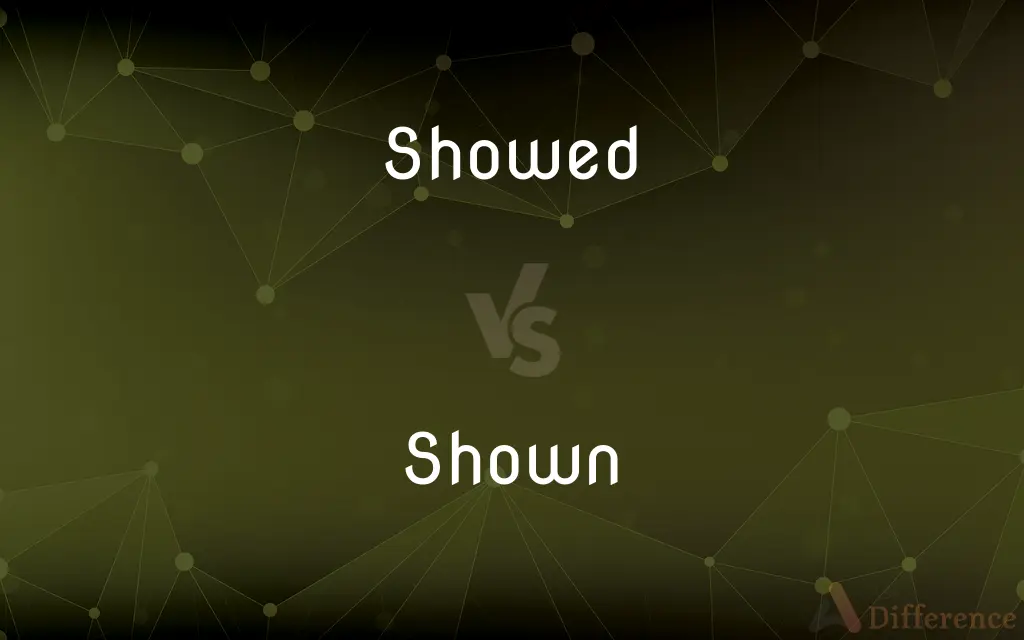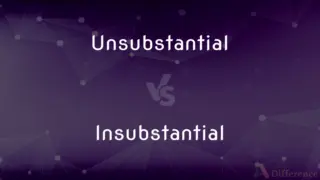Showed vs. Shown — What's the Difference?
By Tayyaba Rehman — Updated on December 30, 2023
"Showed" is the simple past tense of "show," used to describe an action that happened in the past. "Shown" is the past participle form, used with auxiliary verbs to form perfect tenses or passive voice.

Difference Between Showed and Shown
Table of Contents
ADVERTISEMENT
Key Differences
"Showed" is used when describing an action that was completed in the past. For example, "Yesterday, he showed me his new car." "Shown" is the past participle form, used in perfect tense constructions such as, "He has shown great improvement."
In the simple past tense, "showed" stands alone without the need for auxiliary verbs. "Shown" requires an auxiliary verb, like "have" or "has," to construct present perfect sentences, or "was" or "were" for passive voice.
"Showed" is direct and specific to a completed action. "Shown" implies an action that has relevance to the present or is part of a larger time frame.
Examples in sentences: "She showed me how to solve the equation last week" (simple past). "The results have been shown to be effective" (present perfect).
Understanding the context and time frame is crucial for choosing between "showed" and "shown." "Showed" indicates a distinct past action, while "shown" connects the past action to the present or is used in a passive construction.
ADVERTISEMENT
Comparison Chart
Tense
Simple past
Past participle
Auxiliary Verb Usage
Does not need an auxiliary verb
Requires an auxiliary verb (have/has, was/were)
Time Frame
Specific past action
Action relevant to the present or in a larger timeframe
Example Sentence
"He showed me the picture."
"The picture has been shown to many people."
Usage in Passive Voice
Not used in passive voice
Often used in passive constructions
Compare with Definitions
Showed
To display or present something.
She showed her artwork to the class.
Shown
Displayed or presented, often in the context of revealing or demonstrating.
The benefits of the new system have been shown in the report.
Showed
To guide or teach someone how to do something.
He showed me how to fix the car.
Shown
Used in passive voice to indicate something being displayed or presented.
The artwork was shown at the gallery.
Showed
To allow someone to see or look at something.
He showed the guests to their seats.
Shown
Taught or guided by someone in how to do something.
I have been shown how to edit the video.
Showed
To reveal or demonstrate.
The experiment showed the expected results.
Shown
Revealed or made visible.
The results were shown at the end of the experiment.
Showed
To express or exhibit an emotion or quality.
She showed great courage during the rescue.
Shown
Demonstrated a particular quality, emotion, or characteristic.
Great patience has been shown by the team.
Showed
To cause or allow to be seen; display
Showed us his tattoo.
Shown
Shown is an American surname that reflects an Anglicization of the German surname Schaun. A common variant is Shawn.
Showed
To display for sale, in exhibition, or in competition
Showed her most recent paintings.
Shown
A past participle of show.
Showed
To permit access to (a house, for example) when offering for sale or rent.
Shown
Past participle of show
I had shown him the report already.
The report had already been shown to him.
Showed
To conduct; guide
Showed them to the table.
Showed
To direct one's attention to; point out
Showed them the city's historical sites.
Showed
To make evident or reveal (an emotion or condition, for example)
Showed displeasure at his remark.
A carpet that shows wear.
Showed
To reveal (oneself) as in one's behavior or condition
The old boat showed itself to be seaworthy.
Showed
To indicate; register
The altimeter showed that the plane was descending.
Showed
To demonstrate by reasoning or procedure
Showed that the hypothesis was wrong.
A film that showed how to tune a piano.
Showed
To demonstrate to by reasoning or procedure; inform or prove to
Showed him how to fix the camera.
Showed her that it could really happen.
Showed
To grant; bestow
Showed no mercy to the traitors.
Showed
To be or become visible or evident
Concern showed in his face.
Showed
(Slang) To make an appearance; show up
Didn't show for her appointment.
Showed
To be exhibited publicly
What's showing at the movie theater tonight?.
Showed
To give a performance or present an exhibition
Which artist is showing in the gallery?.
Showed
(Sports) To finish third or better in a horserace or dog race.
Showed
A display; a manifestation
Made a show of strength.
Showed
A trace or indication, as of oil in a well.
Showed
The discharge of bloody mucus from the vagina indicating the start of labor.
Showed
The first discharge of blood in menstruation.
Showed
A false appearance; a pretense
Only a show of kindness.
Showed
A striking appearance or display; a spectacle.
Showed
A pompous or ostentatious display.
Showed
Display or outward appearance
This antique tea service is just for show. His smile was for show.
Showed
A public exhibition or entertainment.
Showed
An exposition for the display or demonstration of commercial products
An auto show.
Showed
A usually competitive exhibition of domestic animals
Won first place at the cat show.
Showed
A radio or television program.
Showed
A movie.
Showed
A theatrical troupe or company.
Showed
(Informal) An affair or undertaking
Ran the whole show.
Showed
(Sports) Third place at the finish, as in a horserace.
Showed
Past participle of show(alternative to shown)
Recent polling has showed that 40% are in favour of the candidate.
Common Curiosities
Is "shown" used in passive voice constructions?
Yes, "shown" is commonly used in passive voice.
Can "showed" and "shown" be used interchangeably?
No, they have different grammatical uses based on tense and structure.
Can "showed" be used in the present perfect tense?
No, "showed" is only used in the simple past tense.
Is "shown" used in past perfect tense?
Yes, it can be used in past perfect tense with "had."
Is "shown" always used with an auxiliary verb?
Yes, "shown" requires an auxiliary verb like "have," "has," or "was."
Can "showed" stand alone in a sentence?
Yes, "showed" can stand alone as the main verb in simple past tense sentences.
Can "showed" be followed by an object?
Yes, "showed" can take a direct object.
Can "shown" imply ongoing relevance?
Yes, "shown" in perfect tenses can imply ongoing relevance or impact.
Do "showed" and "shown" have the same meaning?
Yes, the base meaning is the same, but the tense and usage differ.
In which tense is "shown" most commonly used?
"Shown" is most commonly used in present perfect tense.
Is "showed" appropriate for formal writing?
Yes, "showed" is appropriate in formal writing when used in the correct tense.
Is "showed" used in future tense?
No, "showed" is not used in future tense; "will show" is used instead.
Can "shown" be used without a direct object?
Yes, especially in passive constructions.
Is "showed" used in present tense?
No, "shows" is the present tense form.
Can "shown" convey completion of an action?
Yes, especially in perfect tenses, "shown" can indicate the completion of an action.
Share Your Discovery

Previous Comparison
Unsubstantial vs. Insubstantial
Next Comparison
Shrank vs. ShrunkAuthor Spotlight
Written by
Tayyaba RehmanTayyaba Rehman is a distinguished writer, currently serving as a primary contributor to askdifference.com. As a researcher in semantics and etymology, Tayyaba's passion for the complexity of languages and their distinctions has found a perfect home on the platform. Tayyaba delves into the intricacies of language, distinguishing between commonly confused words and phrases, thereby providing clarity for readers worldwide.













































